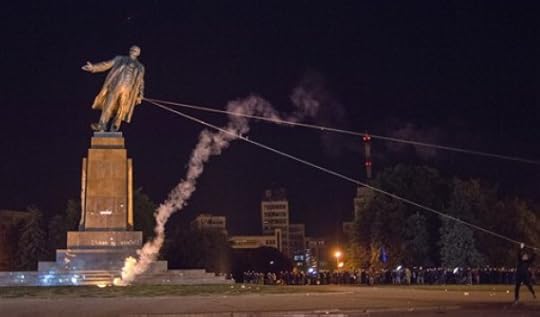Randy Alcorn's Blog, page 58
February 28, 2022
Pray for the Precious People of Ukraine (and Russia), Traumatized by War

“When the righteous increase, the people rejoice, But when a wicked man rules, people groan.” (Proverbs 29:2)
The sight of Russian tanks rolling into Ukraine will never be forgotten by many of us. Incredibly, Russian President Vladimir Putin, now a war criminal, asserted that Ukraine does not truly exist as a nation. The sense of entitlement and the implicit return to the mindset of the old USSR, dismantled 31 years ago, was and is stunning.
Here’s a video of a Ukrainian husband and father saying goodbye as his wife and daughter attempt to escape the country, which he is staying, presumably to fight and defend. As a father of daughters, this really gets to me.
I am struck by how close to home the situation in the Ukraine is to many of us who are what seems a world away. One of our board members is part of a second family to a woman from the Ukraine who has eight close family members there. Another board member, a public high school teacher, says, “I have an 18-year-old exchange student from Ukraine. So he is here living with a host family while his actual family is all back in Ukraine.” A third board member said, “Broken hearted for all involved in oppression. I can’t believe it has gone this far already! I wasn’t expecting it.” One staff member told me, “I read lots of fiction set in WW2. Hard to believe it’s 2022, and war is in Europe.”
On hearing the news of the invasion, my own mind immediately went back to 1991, when my longtime friend and pastor Steve Keels and I spent two weeks in Russia and Ukraine. It was the very year Ukraine would assert its independence, just months after we were there. In my first report on our trip just after returning in May 1991 (How Can We Help Churches in the Soviet Union?) I told the story of how we freely passed out Bibles in public schools and shared the gospel in Ukrainian classrooms for what we were told was the first time ever in that city, Kamanets-Podolsky (alternately spelled Kamianets-Podilskyi), since 1920 when Ukraine became part of the original USSR. (When we were there it was sometimes known as “the Ukraine,” or “the Soviet Ukraine.”)
The photo below is of me speaking, with Bill Kapitaniuk translating, at a rally in a Ukrainian philharmonic auditorium formerly open only to card-carrying members of the Communist party. The whole community was invited, and thousands attended. We shared the gospel, and many came forward to receive Christ, with hundreds asking for Bibles. People literally pressed against us, a sea of humanity reaching to grab hold of God's Word. Forty-five minutes after the rally was over, people still crowded around us, asking us to sign their Bibles (as if we had written them!).

1991 was a unique and historic time in Ukraine. Change and the hope of freedom were in the air we were breathing. Just the previous year, Latvia and Estonia had declared their independence and other countries of the USSR were moving toward doing the same. It was becoming clear that USSR general secretary Gorbachev could not much longer control the territories beyond Russia.
Steve and I were in the Ukrainian city of Kamianets-Podilskyi on April 22, 1991. That was what was then one of the most prominent Soviet holidays, Lenin’s birthday. 121 years after Lenin was born, on the very day of, we were awoken by shouts and loud noises, and looked out our hotel window to the public square below, only to see hundreds of Ukrainian citizens. Some had ropes in hand, and all were attempting to tear down a huge statue of Lenin. It symbolized their rejection of the Russian control of what was once their country and in their hearts still was. We watched soldiers march out and point their weapons toward the protestors. For a few horrifying hours we thought we were going to witness a bloodbath. It seemed miraculous that it didn’t happen. This photo below shows the tearing down of a similar Lenin statue in a different Ukrainian city. Finally the statue came down and not a single shot was fired.

On August 24, 1991, only four months after we left, Ukraine officially declared itself an independent country. The parliament of Ukraine proclaimed that the nation would no longer follow the laws of USSR but only the laws of the Ukrainian SSR, thereby declaring Ukraine's independence from the Soviet Union. That was made final when the USSR dissolved December 26, 1991, eight months after we left.
What hit me when I saw the invasion of the Ukraine is this: the vengeful bloodbath we thought we were about to see in 1991 is actually happening now, 31 years later.
Putin’s actions felt to me like the second coming of Stalin, who committed horrific crimes against the Ukrainian people, worst of all the enforced starvation that killed something like four million people. I mentioned in my letter just after returning home, that we shared the Gospel with a Ukrainian man on a train who a few hours later came to faith in Christ. What I didn’t mention in that letter was that Sergei, in the photo I took below, stunned us by saying that his mother was the only surviving member of her family—both her parents and all her siblings starved to death under Stalin’s horrific, even demonic, acts of murder. Both Steve and Bill appear taken aback by what Sergei was saying, which makes me think I took the photo when he was telling us the part of his story about Stalin starving the people of Ukraine and his mother being the only survivor in her family.

(Keep Sergei’s story in mind when you see the Ukrainians valiantly fighting Russian troops—nearly every Ukrainian family has a history of profound and terrible victimization and loss at the hands of Russian rulers like Putin.)
In the photo below, Pastor Steve Keels is sitting beside Bill Kapitaniuk. Note: the painting of Lenin could do nothing to stop the sharing of the gospel with the staff of a Ukrainian hospital.

Don’t Blame All Russians for Putin
While I entirely concur with the sweeping condemnations of Putin, remember that many Russian people completely oppose the war in Ukraine. On the day of the invasion, Russians in fifty cities went out on the streets protesting the invasion and shouting “No war.” Over 1,800 people were arrested that first day alone. (Having been arrested seven times in Portland for peaceful nonviolent civil disobedience intervening for unborn children in 1989, I can assure you that conditions in American jails are far better than in Russia—pray for those protestors who haven’t been released, some of them may never be.)
The same day of the invasion, 300 Russian journalists signed a letter of protest about the declaration of war against the Ukraine. There have been reprisals from the government, including journalists being excluded from access and a popular talk show host who posted “No to War” having his program taken off the air. Some have quit their state jobs in protest.
Just as we wouldn’t want all Americans blamed for what our political leaders do (God forbid, it includes defending the slaughter of preborn children), we should “do unto others” by not throwing all Russians under the bus for Putin’s madness and cruelty. I’m certain that even many Russian soldiers believe this war is wrong and feel they are in an impossible situation. If they refuse to fight, they can be imprisoned and likely executed for it, and know their wives and children will suffer as a result.
There are many wonderful Russian believers, some of whom I know. A Russian pastor has become a good friend over the years, and has been at odds with the government a number of times, with his family and church at risk. On Sunday February 27 as I write this, I reached out to him an hour ago, and he wrote this back (for obvious reasons I’m not sharing his name):
Our whole church was praying for Ukraine today, had a special meeting. We have lots of dear friends there and are horrified by what is happening.
It IS dangerous to say anything pro-Ukraine, for it is considered extremism and is punishable by law, or better say the lawlessness of Russia’s corrupt government.
Please, pray for us. We are going to get what is coming to Russia, and already experience the pressure of sanctions, the load of which will press on regular people, while * [pejorative nickname for Putin] will lead a good life in his bunker. However, we welcome those things, because one way or the other they will serve the overall purpose of ending these atrocities.
Please do pray for this good brother and his church.
To this day I have vivid memories of the warm and memorable times with families of Ukrainian believers, holding hands with them and their children as they sang Christian hymns powerfully and beautifully, tears streaming down their faces. (We found out later they had put on their tables their entire monthly ration of butter for the sake of their Christian guests from America.) But we also met many fine Christ-followers in Russia. They deserve our love, respect, and prayers for their welfare and courage to stand up against a tyrant and those who defend that tyrant. Make no mistake how God views Putin and what he is doing:
Woe to those who make unjust laws,
to those who issue oppressive decrees,
to deprive the poor of their rights
and withhold justice from the oppressed of my people,
making widows their prey
and robbing the fatherless. (Isaiah 10:1-2)
Let me tell one last story about our time in the Ukraine 31 years ago, which I think speaks to what is going on right now. After a powerful church service in which many had come to Christ, we sat in the church basement enjoying a wonderful Ukrainian meal. Suddenly the door opened and in walked a young man, weary from long travel. As his story unfolded, we learned he was from a remote part of Siberia, where his church had heard that Bibles had come into Ukraine, somewhere near the city of Kiev. His church had laid hands on him and sent him as their ambassador in search for Bibles.
This young man, a Siberian Russian, had traveled seven days on boat from his village—where the only land travel is by dog sled—to the nearest city with an airport. From there he traveled by plane, train, and bus in search of Bibles, but after traveling 2,600 miles he still had none to take home with him. The Lord led him to the Ukrainian church where we had just shared.

The brothers of this church were moved by his story, and promised to give him a suitcase full of their precious Bibles, which we had brought to them, to take back to his people. Steve and I were thrilled to know that this young man, our brother in Jesus, was headed back to cover that 2,600 miles again, bringing Bibles to his church! The moral of the story? A Russian from Siberia found Bibles in the Ukraine, brought in from France by a Canadian (Bill) and two Americans. This is the body of Christ. Nothing—not even a war started by a godless madman—should divide the body of Christ in Ukraine, Russia, America, or anywhere else.
How and Where to Give Financially to Help Those Suffering in Ukraine
If you prefer to designate your funds to EPM so we can determine where to send them, as always 100% of the monies designated will go to them. EPM will not keep a dime. If you simply put Ukraine on the memo line of your check, we will send the funds entirely to ministries such as those below, which we know to be Jesus-centered and committed to sharing both the gospel and whatever help they are able to give. Or if you give online, select “Relief Fund,” and through March 31, we will give everything from that fund to ministries working in Ukraine.
Below are the first five ministries EPM has given to since the invasion of the Ukraine three days ago. We believe in each of them, but there will certainly be many other worthy ministries that we will also recommend and some of which we will support. I’m giving contact info in case you wish to support one or more of these.
In the initial days since the invasion of Ukraine, EPM has sent $26,000 to five different organizations at work there, $16,000 from our general fund plus one special fund gift of $10,000. These ministries are quite different; a few are large, some are much smaller, but they have in common big hearts for God and for people, and they believe God’s Word. Their works complement and supplement each other. These ministries each believe in meeting both physical needs and spiritual needs, not one instead of the other. Here are those five ministries, and again we realize there are many other good ones as well:
Water Mission
Water Mission, a vital ministry EPM loves and supports (see our recent blog), has sent Disaster Assistance Response (DART) teams to Poland and Moldova, which border Ukraine, to assess the needs and implement their response to provide urgent water, sanitation, and hygiene to refugees from Ukraine fleeing the war.
These will primarily be women and children since the Ukrainian government is banning all male citizens ages 18-60 from leaving the country, so they may join in the armed resistance.
See watermission.org
Cru/Unto
the following:
Cru® has over 120 national staff members in Ukraine right now, some with small children. Some families have moved closer to neighboring borders. Others have left the country. Still others have decided to stay and continue ministry. …Some families have been separated as the husband has been called up for military service. As you might imagine, being uprooted and fleeing an active conflict is expensive.
We are raising emergency funds to relocate and house Ukrainian missionary families. As we don’t know how long this crisis will last, finding safe housing for the coming months is absolutely critical.
In addition, we expect many thousands of Ukrainian families will flee to neighboring countries and become refugees. Many will lack basic supplies, and with your help, Cru will provide survival kits for them through Unto®, Cru’s humanitarian aid ministry.
…if you feel God leading you to make an immediate difference, would you consider giving today to help the Ukrainian Cru staff and refugees?
Josiah Venture
This is a quick and enlightening read from a ministry we really believe in that is active in Ukraine.
Action International
Paul Hughes, ACTION UK Director, says this:
Over recent weeks we have been preparing the way to accommodate 300 to 500 internally displaced peoples in Ukraine within a safe network of churches, in conjunction with national, regional and local church leaders. We have a history of many years of fruitful and accountable Gospel partnership with these networks. It breaks our hearts to see what our precious friends are going through.
Our first phase of help sought to mobilize and evacuate many Gospel and mission workers to safety, sometimes out of the country. Many of these workers had with them adopted children from orphanage and trauma backgrounds, or vulnerable adults with severe disabilities. We praise God that this phase is now complete, but for many who remain in Ukraine to help in such ministries, there is now no realistic possibility of immediate evacuation.
We are therefore doing all we can to support those who remain to administer aid and share the Gospel. We are currently providing a core network of five strategic “safe” or holding centers, all of which have witnessed dramatic, lifesaving testimonies over the last 48 hours.
What are we providing? Water, blankets, beds, food, essential communications with loved ones, pastoral counselling, Bibles, and loving care to seek a way forward.
In a context of devastation caused by hatred, our weapons are love and compassion. This is having a profound effect on others (John 13:35).
ACTION USA: PO Box 398, Mountlake Terrace WA, 98043
ACTION Canada: 3015A 21st Street NE, Calgary, Alberta T2E 7T1
ACTION UK: PO Box 144, Wallasey, Wirral CH44 5WE
actioninternational.org/onetime-projects-detail/ukraine-relief
Samaritan’s Purse
They say, “Samaritan’s Purse has deployed disaster response specialists to Poland and Romania. These teams are conducting rapid needs assessments in multiple countries neighboring Ukraine to determine how we can meet emergency needs.”
samaritanspurse.org/article/pray-for-the-crisis-in-ukraine
Scripture about Helping the Oppressed and Needy
Though this is already a long article, you might want to take a break and then come back. Sometimes we need a reminder about how important it is to God that we intervene for the needy. (Some people see this as a distraction from spreading the gospel, when in fact it’s a vital part of following Jesus.) When you see the word “poor” in the Bible, realize that the poor are not simply those with little money; most often they are those who are also oppressed and victimized by powerful forces, sometimes within their own nation, and sometimes by invading nations. God has a special place in His heart for such people.
But Yahweh reigns forever, executing judgment from his throne. He will judge the world with justice and rule the nations with fairness. Yahweh is a shelter for the oppressed, a refuge in times of trouble. Those who know your name trust in you, for you, O Yahweh, do not abandon those who search for you. (Psalm 9:7-10)
Yahweh executes righteousness and judgment for all that are oppressed. (Psalm 103:6)
But joyful are those who have the God of Israel as their helper, whose hope is in Yahweh their God. He made heaven and earth, the sea, and everything in them. He keeps every promise forever. He gives justice to the oppressed and food to the hungry. Yahweh frees the prisoners. (Psalm 146:5-7)
The wicked frustrate the plans of the oppressed, but Yahweh will protect his people. (Psalm 14:6)
He raises up the poor from the dust; he lifts the needy from the ash heap to make them sit with princes and inherit a seat of honor. For the pillars of the earth are Yahweh’s, and on them he has set the world. (1 Samuel 2:8)
For the needy shall not always be forgotten, and the hope of the poor shall not perish forever. (Psalm 9:18)
All my bones shall say, “O Yahweh, who is like you, delivering the poor from him who is too strong for him, the poor and needy from him who robs him?” (Psalm 35:10)
As for me, I am poor and needy, but the Lord takes thought for me. You are my help and my deliverer; do not delay, O my God! (Psalm 40:17)
Blessed [happy] is the one who considers the poor! In the day of trouble the Lord delivers him. (Psalm 41:1)
For he delivers the needy when he calls, the poor and him who has no helper. (Psalm 72:12)
“This is what the LORD of Heaven’s Armies says: Judge fairly, and show mercy and kindness to one another. Do not oppress widows, orphans, foreigners, and the poor. And do not scheme against each other.” (Zechariah 7:9-10)
Those who oppress the poor insult their Maker, but helping the poor honors Him. (Proverbs 14:31)
A person who gets ahead by oppressing the poor or by showering gifts on the rich will end in poverty. (Proverbs 22:16)
Whoever oppresses a poor man insults his Maker, but he who is generous to the needy honors him. (Proverbs 14:31)
Whoever is generous to the poor lends to the Lord, and he will repay him for his deed. (Proverbs 19:17)
The generous will themselves be blessed, for they share their food with the poor. (Proverbs 22:9)
The poor and needy search for water, but there is none; their tongues are parched with thirst. But I Yahweh will answer them; I, the God of Israel, will not forsake them. (Isaiah 41:17)
Photo by Max Kukurudziak on Unsplash
February 25, 2022
Sexual Sin Is Not Inevitable

A few years back, a church not far from where I live announced that they’d dismissed their nationally known senior pastor for adultery. I have seen this happen again and again and again—in churches, ministries, businesses, entertainment, sports and everywhere else. Satan paints a target on each of our chests.
But we have a choice about whether Satan will hit that target. Sexual sin is NOT inevitable. Many Christians are seeking God’s will in any number of areas. A good place to start is with God’s directly stated will: “It is God’s will that you should be sanctified: that you should avoid sexual immorality” (1 Thessalonians 4:3).
God never commands us to do anything without providing the resources to obey by the power of the Holy Spirit: “Walk by the Spirit, and you will not gratify the desires of the flesh” (Galatians 5:16).
Consider this story I share in The Purity Principle: Having grown up in a strong church family, Eric met and married a Christian girl. Yet sitting across from me, he was the picture of misery.
“I’m mad at God!”
“Okay...so why are you mad at God?” I asked.
“Because,” he said, “Last week I committed adultery.”
Long pause. Finally I said, “I can see why God would be mad at you. But why are you mad at Him?”
Eric explained that for several months he’d felt a strong, mutual attraction to a woman at his office. He’d prayed earnestly that God would keep him from immorality.
“Did you ask your wife to pray for you?” I said. “Did you stay away from the woman?”
“Well...no. We went out for lunch almost every day.”
Slowly, I started pushing a big book across my desk. Eric watched, uncomprehending, as the book inched closer and closer to the edge. I prayed aloud, “O Lord, please keep this book from falling!”
I kept pushing and praying. God didn’t suspend the law of gravity. The book went right over the edge, smacking the floor.
“I’m mad at God,” I said to Eric. “I asked Him to keep my book from falling...but He let me down!”
In Proverbs 4:23, in the near context of warnings against sexual immorality, God tells us, “Above all else, guard your heart, for everything you do flows from it.” God gives us the responsibility to shield that bullseye, availing ourselves of His Word and His people to remain unscathed.
Here’s an article I wrote called Counting the Cost of Sexual Immorality. In it I share a list of consequences that I took with me when traveling and read as a reminder and incentive to guard my purity.
I highly recommend John Piper’s message called “You can say no to porn.” Take just five minutes to watch this excerpt, which has the surprising title “You are not addicted” (there’s also a link to the full message).
And, here’s something I wrote on pursuing sexual purity in your marriage.
“Flee from sexual immorality…You are not your own; you were bought at a price. Therefore honor God with your bodies” (1 Corinthians 6:18-20).
“Therefore let anyone who thinks that he stands take heed lest he fall. No temptation has overtaken you that is not common to man. God is faithful, and he will not let you be tempted beyond your ability, but with the temptation he will also provide the way of escape, that you may be able to endure it” (1 Corinthians 10:12-13).
God is faithful. And He’s given us everything we need to be faithful too.
For resources on this subject, see Randy’s book The Purity Principle and booklet Sexual Temptation: Establishing Guardrails and Winning the Battle.
Photo by Engin Akyurt from Pexels
February 23, 2022
There Is a Reason Why You Have That Thorn

Note from Randy: Like many of you, Nanci and I are facing some tough circumstances right now. In her case it’s cancer; in your case, it may be something different or something worse. But for sure God is good, God is in charge, and God has a plan. This is why we have hope—not the wishful thinking sort of hope, but a certain hope and assurance based on the unswerving character of our God, and the blood-bought promises of Jesus. “May the God of hope fill you with all joy and peace as you trust in him, so that you may overflow with hope by the power of the Holy Spirit” (Romans 15:13).
Why You Have That Thorn
By Jon Bloom
I have a “thorn in the flesh.” I don’t like it. I often wish I didn’t have it. At times I am exasperated by it. It makes almost everything harder, daily dogging me as I carry out my family, vocation, and ministry responsibilities — nearly everything I do. It weakens me. I often feel that I would be more effective and fruitful without it. I have pleaded with God, sometimes in tears, for it to be removed or for more power to overcome it. But it remains.
No, I’m not going to explain what it is. The details aren’t germane to the point I want to make, and I think they would actually make this article less helpful. Because you have your own thorn in the flesh, or if you live long enough you’ll be given one (or more). Yours will be different from mine, but its purpose will be similar. For we are given thorns that significantly weaken us in order to make us stronger.
The Most Famous Thorn
We get the term “thorn in the flesh” from the apostle Paul:
To keep me from becoming conceited because of the surpassing greatness of the revelations, a thorn was given me in the flesh, a messenger of Satan to harass me, to keep me from becoming conceited. (2 Corinthians 12:7)
“The most redemptive gift of pain in history was given to us through the most evil means.”
Paul’s thorn is among the most famous afflictions in history, and we don’t even know what it was. There’s been a lot of speculation over the years. Paul’s thorn could have been a physical affliction. This is plausible given all the physical violence and deprivation he endured (2 Corinthians 11:23–27), and some think he may have suffered from an eye disease (Galatians 4:15).
Or since he referred to his thorn as a harassing “messenger of Satan,” he could have been vulnerable to significant spiritual-psychological struggles. This is plausible given the cumulative trauma of violently persecuting Christians, then suffering violent persecution, living in constant danger as a Christian, and then living with daily “anxiety for all the churches” (2 Corinthians 11:28).
Or given the context of 2 Corinthians 11–12, his thorn could plausibly have been the “super-apostles” and false brothers constantly dogging him and wreaking havoc in the churches he planted (2 Corinthians 11:5, 26). Or it might have been something else altogether.
The fact that we really don’t know what Paul’s thorn was turns out to be both merciful and instructive to us. It’s merciful because, given the various possibilities, we all can identify with Paul to some degree in our afflictions. It’s instructive because what Paul’s thorn was isn’t the point. The point is what God’s purpose was for the thorn.
Sent from God’s Hand
Paul makes two amazing, and somewhat initially disturbing, statements about his painful thorn — in the same sentence:
To keep me from becoming conceited because of the surpassing greatness of the revelations, a thorn was given me in the flesh, a messenger of Satan to harass me. (2 Corinthians 12:7)
The first amazing claim Paul makes is that God gave him his thorn. It’s clear from the context that Paul identified God as his thorn-giver, not Satan. And he understood that God’s purpose was to keep Paul humble and dependent on Christ’s power (2 Corinthians 12:9).
Now, most of us can’t identify with the sorts of revelations Paul was given, and when we read the kinds of suffering Paul experienced (2 Corinthians 11:23–27), it’s probably safe to assume our thorns don’t pierce as deeply as his did. But God’s purpose in our thorns is similar.
Pride, in all its manifestations, is our most pervasive sin and the most dangerous to us spiritually. Anything God gives us to keep us humble and prayerfully dependent on him is a great gift — even when that gift causes us pain. And here we see clearly that God disciplines his children with affliction in order to protect them from having their joy destroyed by the sin of pride. Ponder that: pain can protect us from pain; redemptive pain can protect us from destructive pain.
Satanic Harassment
But the second amazing claim Paul makes is more shocking: the redemptive pain God gave Paul to protect him from the destructive pain of his pride was delivered to him by “a messenger of Satan.” Suddenly, we find ourselves in an even deeper part of the theological pool. And given the ease with which Paul says this, he clearly expects Christians to be able to swim here.
Satan pierces us with a thorn from God? Yes. Does this trouble us? Does it trouble us that it didn’t trouble Paul? Paul feels no need to qualify or explain how God can give his child a redemptive gift of pain through an evil means. Why? Because this phenomenon occurs throughout the Bible. Paul knows his Old Testament like the back of his hand, and it has truths like this woven throughout it: “you meant evil against me, but God meant it for good” (Genesis 50:20). And he knows that the most redemptive gift of pain in history, the death of Christ the Lord, was given to us through the evilest means.
Our redemptive thorns also may be delivered by a satanic messenger. But we can know this: it will only be one more way that God “disarms the rulers and authorities and puts them to open shame” (Colossians 2:15). Our God is so powerful and so wise that he can work all things — including our satanically delivered thorns — for our good (Romans 8:28). Trust in this kind of sovereignty is what fuels our joyful, confident contentedness while experiencing the weakness and weariness of our affliction.
Pierced for a Purpose
Just like Paul’s, our thorns weaken us. Sometimes they are visible to others, but often they are hidden from public view, known only to those who know us best. And they are never romantic, never heroic. Rather, they almost always humble us in embarrassing rather than noble ways. They not only seem to impede our effectiveness and fruitfulness, but they also are more likely to detract from rather than enhance our reputations. Which is why we, like Paul, plead with God to remove them (2 Corinthians 12:8).
But this is the way our thorns have to be. Because if they were noble and heroic, if they enhanced our reputations, they would be of no help at all in guarding us from our pervasive pride. Which is why, as with Paul, God often answers our pleas for deliverance with a “no.” Because without the thorn, we would never experience that “[God’s] grace is sufficient for [us],” that his “power is made perfect in weakness” (2 Corinthians 12:9).
This is the reason we have our thorns. They are weakeners that strengthen us. Without them, we would choose a weaker strength and miss experiencing the glory of God’s powerful grace and realize lesser joys as a result. It’s just one more wonderful kingdom paradox: our agonizing thorns end up producing greater joy in us and ultimately make us more effective and fruitful. The more we press into this paradox, the more we will say with Paul,
Therefore I will boast all the more gladly of my weaknesses, so that the power of Christ may rest upon me. For the sake of Christ, then, I am content with weaknesses, insults, hardships, persecutions, and calamities. For when I am weak, then I am strong. (2 Corinthians 12:9–10)
This article originally appeared on Desiring God and is used with permission of the author.
Photo by Kevin Butz on Unsplash
February 21, 2022
Meet the Son of Holocaust Survivors Who Advocated for the Unborn, Targeted in the Holocaust of Abortion

One day I sat on a plane next to a young man, an intelligent college graduate, who told me he believed evil doesn’t exist.
“If there’s no such thing as evil,” I said, “then the Holocaust wasn’t evil. Is that what you believe?”
He grimaced, then finally, stammering, said, “Well, I guess the Holocaust was a mistake.” I suggested to him that in his heart he must know it was something far worse.
Years before Nanci and I had an unforgettable experience at Yad Vashem, Jerusalem’s Holocaust museum. It has 1,500 candles, with mirrors designed to reflect each candle a thousand times, representing the 1.5 million children killed in the Holocaust. We stood in the darkness hearing the names of individual children read one by one.
That experience remains among the most haunting and unforgettable experiences of my life. We watched sobbing men and women poring through books to find the names of their murdered relatives. What surrounded us cried out for an explanation even bigger than human depravity.
I think often of that young man, the one on the plane who told me he didn’t believe in evil. When I asked him whether the Holocaust was evil, he replied, “I guess it was a mistake.” But his body language betrayed him. It was evil... and he knew it.
One test of a worldview is whether you sometimes have to borrow from another because yours doesn’t work. That’s what this young man had to do. I believe he recognized what he refused to verbalize. Nazis slaughtered millions of Jews because their hatred was so deep that it defied all natural explanation. To admit the Holocaust was evil, he would have to abandon his worldview and borrow the concepts of both human and demonic evil from a worldview he didn’t want to believe.
Like the Holocaust, abortion is an evil so great that words fall short of describing it. At Yad Vashem, I was struck by the number of children who had been killed, because at the time it was the same number killed by abortion in America each of the previous few years. The fact that most of these children haven’t been given names doesn’t diminish their worth. I have stood at memorials for the unborn where parents have given names to their children and written them expressions of love and grief. If we could only hear the names of each of these children whispered to us in the darkness, perhaps we would wake up.
Holocaust scholar Raul Hilberg argued that the key to the widespread destruction of the Jewish people was the use of degrading terminology such as “useless eaters” and “garbage,” which blinded society to the fact that real people were being killed. Likewise, abortion-rights advocates have referred to unborn babies as debris, garbage, clumps of cells, and “products of conception.”
The concentration camps of Nazi Germany are a testimony to what happens when people start deciding who has the right to live and who doesn’t. The sign at Auschwitz says, “Never Again.” Yet holocausts have happened again. I hope that someday our country will admit that abortion kills children and will say, “Never Again.”
 I recently learned that pro-life advocate Sol Pitchon passed away this month. He served as CEO for New Life Solutions (formally known as The Pregnancy Center of Pinellas County) for 23 years. Under his leadership, it became one of the nation’s most impactful life-affirming ministries. In this video, filmed several years ago, Sol shared his passion for the unborn and the amazing story of how his mother survived a Nazi surgical sterilization attempt during the Holocaust. “I am trying to connect the dots,” Sol said. “Abortion in the United States is our Holocaust.”
I recently learned that pro-life advocate Sol Pitchon passed away this month. He served as CEO for New Life Solutions (formally known as The Pregnancy Center of Pinellas County) for 23 years. Under his leadership, it became one of the nation’s most impactful life-affirming ministries. In this video, filmed several years ago, Sol shared his passion for the unborn and the amazing story of how his mother survived a Nazi surgical sterilization attempt during the Holocaust. “I am trying to connect the dots,” Sol said. “Abortion in the United States is our Holocaust.”
For more on the problem of evil and suffering, see Randy’s book If God Is Good. For more on abortion, see his book Pro-Choice or Pro-Life?
February 18, 2022
Lord, Help Me to Glorify You: A Prayer from Charles Spurgeon
Note from Randy: This prayer (with updated language) is from the February 15 morning entry of Charles Spurgeon’s Morning and Evening: Daily Readings. There’s hardly any man outside of Scripture itself who speaks to me like Spurgeon does. I highly recommend Morning and Evening as a daily dose of great theology. You can also sign up to receive them each day by email.
You might also enjoy my book We Shall See God, which contains segments from Spurgeon’s sermons on Heaven, so about 60% of the book is Spurgeon. It was one of my favorite books to work on, since I extracted my favorite portions from many of his messages.
Lord, help me to glorify you;
I am poor, help me to glorify you by contentment;
I am sick, help me to give you honor by patience;
I have talents, help me to extol you by spending them for you;
I have time, Lord, help me to redeem it, that I may serve you;
I have a heart to feel, Lord,
let that heart feel no love but yours,
and glow with no flame but affection for you;
I have a head to think,
Lord, help me to think of you and for you;
You have put me in this world for something, Lord,
show me what that is,
and help me to work out my life-purpose:
I cannot do much, but as the widow put in her two mites,
which were all her living,
so, Lord, I cast my time and eternity too into your treasury;
I am all yours;
take me, and enable me to glorify you now,
in all that I say, in all that I do, and with all that I have.
– Charles Spurgeon
Photo by Jasper Van Lommel on Unsplash
February 16, 2022
Super Bowl MVP Cooper Kupp’s Example of Boldly Acknowledging Christ

I enjoyed Sports Spectrum’s article Rams WR Cooper Kupp finds ultimate purpose in honoring God on journey to Super Bowl. It included these two short videos of Kupp being interviewed before the game:
"You will find you are most fulfilled and most joy when you are rooted in your purpose."@RamsNFL wide receiver Cooper Kupp shares how he finds his purpose in Christ@CooperKupp pic.twitter.com/ZOk9wzEFku
— Sports Spectrum (@Sports_Spectrum) February 8, 2022
This interaction between @CooperKupp and a kid reporter ❤️
????: #SBOpeningNight live on NFL Twitter pic.twitter.com/4AUVcQrQlY
— NFL (@NFL) February 7, 2022
His team, the Los Angeles Rams, ended up winning the Super Bowl, and Kupp was named Most Valuable Player. But regardless of that, even if they’d lost and Kupp had not played well, everything he says would still be true. In fact, in the first interview above, Kupp says that because of his growth in his walk with Christ, even if his team hadn’t won a single game it still would have been his best year in football ever! (Here’s an article about Cooper Kupp and his wife Anna Marie. She says, “We have prayed for a season to glorify our Savior Jesus Christ and you are doing just that my lovey @cooperkupp.”)
I love the second video where he’s interviewed by a young boy who asks him “What drives you to be the best you can possibly be?” With no hesitation Kupp credits his faith and says his goal every day is to honor God. The boy finishes by saying, beautifully, “I have the same faith.” I sent the article and videos to all five of my grandsons and encouraged them to be bold about their faith and speak out about it like Kupp and the boy did in that interview.
Jesus said, “Everyone who acknowledges me publicly here on earth, I will also acknowledge before my Father in heaven” (Matthew 10:32, NLT). That’s why I especially appreciate players and people of all vocations who are not afraid to say, “I love Jesus.” (Some professional athletes have told me no one cares if you mention God, but your stand becomes clear when you mention Jesus, which some don’t like; that's the way it’s always been.)
C. S. Lewis wrote, “We must show our Christian colors, if we are to be true to Jesus Christ. We cannot remain silent or concede everything away.” Even the Apostle Paul requested that the Ephesian believers “Pray also for me, that whenever I speak, words may be given me so that I will fearlessly make known the mystery of the gospel, for which I am an ambassador in chains. Pray that I may declare it fearlessly, as I should” (Ephesians 6:19–20, NIV). If Paul needed prayer for boldness, who doesn’t? When he was given the MVP award Kupp said, “I don’t feel deserving of this. God is just so good…”
I love what Catherine Marshall wrote: “When your heart is ablaze with the love of God, when you love other people—especially the ripsnorting sinners—so much that you dare to tell them about Jesus with no apologies, then never fear, there will be results.”
May we say with Paul, “I am not ashamed of the gospel, for it is the power of God for salvation to everyone who believes” (Romans 1:16 ESV). And may we daily ask the Lord Jesus to give us opportunities to share His “good news of great joy” (Luke 2:10 ESV).
February 14, 2022
Finding Happiness in Christ Is Not Automatic

The book of Nehemiah records God’s sovereign plan to rebuild Jerusalem. Yet it repeatedly shows Nehemiah’s strategic positioning of his people to counter the building project’s many enemies: “We prayed to our God and posted a guard day and night to meet this threat” (Nehemiah 4:9, NIV). Their prayer acknowledged God’s sovereignty. Their preparations recognized their responsibility to act wisely.
Likewise, our actions should be in concert with our prayers—we should pray to find happiness in God and then take the kind of actions that will help us find happiness in God.
Some say, “I thought I would experience joy in the Christian life, but I never have.” Is that because we spend hours a day on social media but “don’t have time” to join a home Bible study? Do we schedule lunches and tennis matches but not regular times with God? Why do we expect to be happy in God when we’re not choosing to do what we can to learn, study, and discuss who God is, what He has done, and what He’s doing?
The Christian life is supernatural but not enchanted. God doesn’t magically make us happy despite the fact that we make work, sports, leisure, or sex into our idols. If we choose to seek happiness elsewhere, God won’t force Himself on us. And He certainly won’t give us happiness in what’s not from Him or what’s distanced from Him.
Happiness comes naturally in the same sense that fruit comes naturally from a tree. If the tree gets sufficient sunshine and water, if the ground is rich in nutrients, if the tree doesn’t contract diseases, then yes, it “naturally” produces fruit. We must plant ourselves in the rich soil of God’s Word, soak in the living water of God and His people, and bask in the radiant sunlight of His grace. And then happiness will come naturally.
In this video, Pastor Greg Laurie and I answer the question, “What are things that contribute to happiness, and what are things that deplete it?”
Watch our full interview here.
Browse more resourceson the topic of happiness, and see Randy’s related books, including Happiness and Does God Want Us to Be Happy?
Photo by Priscilla Du Preez on Unsplash
February 11, 2022
The World Is Busy Promoting Its Catechism—Will We Get Busy Teaching Ours?

Note from Randy: In this article, Kevin DeYoung talks about how our culture is training us—and especially our children—to see sin as normal and to question God’s design for identity and sexuality. He mentions that this was on full display at last summer’s Olympics. I too am a great fan of the Olympics, but there were times when I was watching and felt what Tolkien called “a great shadow” over them. I thought of all the kids watching and being taught to celebrate gender confusion. We are placing ourselves under the judgment of God, and I think it is infecting the church far more than we realize. In fact, I know it is. Many people have given up already or are headed that direction.
Here’s Kevin’s article, and at the end, our staff has put together some suggestions for parents and families related to these issues.
The World Is Catechizing Us Whether We Realize It or Not
I love the Olympics. I got up early and stayed up late to watch whatever I could in real time. As a family, we figured out the various NBC platforms and turned on something from the Olympics almost all the time for two weeks. I’d put our knowledge of Olympic swimming and (especially) track and field up against almost anyone. I’m a big fan of the Olympics.
But something was different this time around. And judging from conversations with many others, I’m not the only one who noticed.
You couldn’t watch two weeks of the Olympics—or at times, even two minutes—without being catechized in the inviolable truths of the sexual revolution. Earlier in the summer, I watched parts of the Euro, and you would have thought the whole event was a commercial for rainbow flags. And yet, the packaging of the Olympics was even more deliberate. Every day we were taught to celebrate men weightlifting as women or to smile as a male diver talked about his husband. Every commercial break was sure to feature a same-sex couple, a man putting on makeup, or a generic ode to expressive individualism. And of course, Megan Rapinoe and Sue Bird were nearly ubiquitous. If America used to be about motherhood and apple pie, it’s now about birthing persons and lesbian soccer stars hawking Subway sandwiches.
Some will object at this point that the last paragraph is filled with a toxic mix of homophobia, heteronormativity, cisgender privilege and a host of other terms that were virtually unknown until five minutes ago. But those labels are not arguments against biblical sexual morality so much as they represent powerful assumptions that no decent person could possibly believe that homosexuality is sinful behavior, that marriage is between a man and a woman, and that switching genders is a sign of confusion more than courage. What NBC presented as heroic and wonderful was considered wrong and troublesome by almost everyone in the Christian West for 2,000 years. Is it possible that instead of deconstructing the beliefs that have marked Christianity for two millennia, we might want to deconstruct the academic jargon our culture has only come to affirm within my lifetime? Remember, it was only in 2008—hardly the dark days of the Middle Ages—that Barack Obama said he did not support marriage for same-sex couples.
I know there are many issues confronting the church today. In some contexts, there may be a lack of love toward outsiders, or a fascination with conspiracy theories, or a temptation toward idolatrous forms of Christian nationalism. You may think that the drumbeat of the advancing sexual revolution is still far off in the distance, a problem in someone else’s village but not in yours.
But no one lives in an isolated village anymore, and the wider world is not tempting young people with the blessings of chastity and church attendance. People older than me may have enough Christian maturity and cultural memory to roll their eyes at the sexual revolution’s round-the-clock bombardment. But if you are a Millennial or Gen Z (or whatever comes next) your first instinct is likely to be more upset with Christians offering criticism of Megan and Sue kissing than with the fact that their kissing is demonstrably not Christian.
It is worth remembering David Well’s famous definition: worldliness is whatever makes righteousness look strange and sin look normal. Here’s the reality facing every Christian in the West: the money, power, and prestige of the mainstream media, big time sports, big business, big tech, and almost all the institutions of education and entertainment are invested in making sin look normal. Make no mistake: no matter how good your church, no matter how strong your family, no matter how gospel-centered your Christian school or homeschool, if your children and grandchildren are even remotely engaged with contemporary culture (and they are), they are being taught by a thousand memes and messages every week to pay homage to the rainbow flag.
The Christian family, Christian church, and Christian school must not assume that the next generations will accept the conclusions that seem so obvious to older generations. We must talk about the things our kids are already talking about among themselves. We must disciple. We must be countercultural. We must prepare them to love and teach them what biblical love really means. We must pass on the right beliefs and the right reasons for those beliefs.
We must prepare our children—and be prepared ourselves—that following Christ comes with a cost (Luke 9:23). The Jesus who affirmed marriage as between a man a woman (Matt. 19:4-6), the Jesus who warned of the porneia within (Mark 7:20-23), the Jesus who warned against living to be liked by others (John 12:43), this Jesus demands our total allegiance (Matt. 28:20).
The world is already busy promoting its catechism. The only question is whether we will get busy promoting ours.
This article originally appeared on The Gospel Coalition and is used with permission of the author.
Further Resources
Here are some resources to help parents know how to guide their children to embrace, cultivate, and find identity and security in their God-given gender:
In his ebook A Parent’s Guide to Teaching Your Children About Gender: Helping Kids Navigate a Confusing Culture, Jared Kennedy offers basic explanations and step-by-step guidance for parents seeking to understand and address various issues related to gender and sexuality.
Christ-Centered Parenting: Gospel Conversations on Complex Cultural Issues equips parents to address pressing cultural topics which children of all ages, from preschoolers through young adults, face, including gender issues and same-sex marriage.
Rebecca McLaughlin’s book 10 Questions Every Teen Should Ask (and Answer) about Christianity has two chapters on “Why Can’t We Just Agree That Love Is Love?” and “Who Cares If You’re a Boy or a Girl?”
For younger children, in his book God Made Boys and Girls: Helping Children Understand the Gift of Gender, Marty Machowski shares the simple, clear truth that all of us are made in God's image as either male or female and what God made is very good.
Photo by Priscilla Du Preez on Unsplash
February 9, 2022
How Important Is It for Believers to Be Debt Free?

I’m encouraged when I see believers focused on getting out of debt. My book Money, Possessions and Eternity has a whole chapter on debt. My little book Managing God’s Money has a couple of chapters related to debt. I also talk about debt briefly in The Treasure Principle and again in my newer book Giving Is the Good Life.
According to CreditCards.com, the average American has $5,111 in credit card debt. Slightly more than 40 percent of Americans carry credit card debt month to month, continuing to spend more than they earn and remaining in financial bondage. The average college student graduates with $36,510 in student loans, and some with far more.
Those pursuing the “good life” routinely incur debt, yet psychologists attest that a debt-funded lifestyle leads to depression, anxiety, resentment, stress, denial, anger, frustration, regret, shame, embarrassment, and fear. (That doesn’t sound like a very good life after all.)
If we take God’s Word seriously, we should avoid debt when we can, since “the borrower is servant to the lender” (Proverbs 22:7, NLT). And since Jesus tells us we cannot serve both God and money, we should ask ourselves, before undertaking any debt, How will this affect my capacity to give generously?
In rare cases—for instance, when we buy a reasonably priced house that may be a good long-term investment—we should borrow only enough to allow us to make affordable payments and pay off the debt as early as possible. Countless people end up spending more on a house than they can afford, and then for years regret that they “can’t afford to give.”
We must learn to say no to many of our wants in order to say yes to obedience, freedom, and generosity—and the happiness God brings to us through them.
Though staying out of debt to begin with is preferable, I’m all in favor of people working to get out of debt. My one concern is that I see some believers whose whole purpose in doing so is to have more money to spend on themselves. It’s not that making plans for the future and going on vacations are inherently wrong. The problem arises when the end result is these debt-free believers becoming more efficient materialists rather than devoted hearts sold out to the kingdom of God.
I’ve even heard teaching within the Christian community, including personal finance counseling, that encourages people not to give before they get out of debt. That’s not eternity-minded, kingdom-centered advice!
When we give, God is pleased and will honor our efforts to pay off our debts. God says that when His people give Him tithes and freewill offerings, He will “throw open the floodgates of heaven and pour out so much blessing that there will not be room enough to store it” (Malachi 3:10, NIV). Even if you don’t believe this passage applies to New Testament Christians, surely these words of Jesus do: “Give, and it will be given to you” (Luke 6:38). Isn’t that exactly what people who want to get out of debt need?
So my advice to those who are in debt and want to get out is this: be a generous giver. And, at the same time, labor to get out of debt so you can invest in God’s kingdom with the money that is freed up. Yes, this won’t always be easy and will take wisdom. But that’s exactly what God promises to give us when we ask (James 1:5). We should desire to become wise stewards and generous givers, rather than self-serving keepers.
Unfortunately, I think many Christians today are getting only half the message about financial stewardship. They grasp the part about the importance of getting out of debt. But they think it’s so that they can have more money to spend on themselves. No! Jesus’ warning applies here: “Watch out! Be on your guard against all kinds of greed; life does not consist in an abundance of possessions” (Luke 12:15, NIV).
Let’s get out of debt so we can give more money to God’s kingdom, and be financially free, not centering our lives around our debt. Our goal should be a life that mirrors Jesus’ generosity, not a money and possessions-driven life.
Photo by RODNAE Productions from Pexels
February 7, 2022
The Beijing Olympics: Pray for the Persecuted in China

During the 2008 Summer Olympics, I wrote about the ethical concerns with Beijing hosting the games. Just as I did then, I have mixed feelings about these Olympics. Certainly I enjoy watching the athletes, and celebrating the cooperation between the nations that’s demonstrated. But are a number of the countries represented doing unethical things? Yes. (Including, by the way, the USA, since we are the leading proponents of child-killing in the world, funding abortions not only in our own country and in many others. See my note at the end of this blog.)
Should a country such as China, which violates human rights in dramatic ways, including but not limited to the horrific genocide of the Uighur people) be rewarded by the global community by being given the Olympics? No.
 This blog is not an appeal to boycott the Olympics, though some may readers feel compelled to do so. You can make your own decision about that. But just be aware—the face of China being represented is often not the real China, or at least not reflective of the whole China. Sure, any host of the Olympics wants to put their best face on, just as you probably do when you check the mirror before you go out and meet someone. But human rights violations in China are way worse than a blemish. Tony Perkins with the Family Research Council writes, “A six-hour plane ride away from the greatest sports spectacle of the last two years, the host is hiding the biggest torture network of the modern age. And the International Olympic Committee knew it.”
This blog is not an appeal to boycott the Olympics, though some may readers feel compelled to do so. You can make your own decision about that. But just be aware—the face of China being represented is often not the real China, or at least not reflective of the whole China. Sure, any host of the Olympics wants to put their best face on, just as you probably do when you check the mirror before you go out and meet someone. But human rights violations in China are way worse than a blemish. Tony Perkins with the Family Research Council writes, “A six-hour plane ride away from the greatest sports spectacle of the last two years, the host is hiding the biggest torture network of the modern age. And the International Olympic Committee knew it.”
Ethically speaking, having China host the games sends the message “human rights aren’t that big a deal—you can persecute people, imprison them for religious and political reasons, but we’ll still honor you by making you host of the Olympics.” It also sends a “we’ll look the other way” message.
Again, in all fairness, prolife Christians should be just as disturbed by the U.S. government’s funding the slaughter of the unborn. Should we boycott the Olympics in China while celebrating the Olympics when it’s in the U.S.? Again, this is a decision of conscience individual believers have to make—there is no absolute revealed answer. In my case, I believe the Olympics do not serve to promote hostility and racism and genocide or global abortion. I think for the most part, they are a secular and of course imperfect attempt to help people see those in other countries around the world as fellow human beings who have dignity and are worthy of respect. So in my thinking the Olympics itself, regardless of its location, has more good to it than it does bad.
If you would boycott the Olympics when it’s in China, due to their human rights violations, should you also boycott all goods and services from China? Using the same logic, would you boycott the Olympics when in America, due to our human rights violations against our smallest and most helpless children? Will you also boycott all goods and services made in America? (How’s that going to work for you?)
However, that doesn’t mean we shouldn’t express our moral concerns. I am personally thankful that all the attention is bringing these human rights issues to the forefront, and again putting China under world scrutiny.
Also on the positive side, the Olympics are and will certainly result in the gospel being brought into China, because every Christian athlete, coach, trainer, and support personnel can bring in a gospel witness and perhaps many will bring in Chinese gospel literature. Ultimately, I believe our sovereign God of providence will bring good out of this. Also, with China being the focus of world attention, there will be more prayer for Chinese believers, and God will answer.
Since I wrote my novel Safely Home twenty years ago, I’ve often been asked if there is still persecution of Christians in China. The answer is yes. Still, many American Christians, including some Christian leaders, have been led to believe persecution is a relic of the past and that the picture painted in Safely Home no longer pertains. (I truly wish it didn’t!) Bob Fu, a Chinese national, now labors in the U.S. to call attention to millions of persecuted countrymen. I encourage readers to examine Fu’s website and listen to these stories: www.chinaaid.org. In his article With All Eyes on the Olympics, China Threatens House Churches, Bob shares about the 60 members of the Shenzhen Holy Reformed Church, nicknamed the “Mayflower church,” who fled to South Korea but have been denied their request for asylum. He calls upon the U.S. to help this group of persecuted Christians.
Voice of the Martyrs shares these five ways you can pray for Chinese Christians during the Olympic Games:
Pray for Chinese pastors and church leaders to continue to stand firmly for biblical truth in spite of government pressure to compromise.
Pray for the encouragement of Chinese believers and that they will experience unity and fellowship as members of the body of Christ.
Pray for Christians in prison. Pray for God’s protection over them, for their health and nutrition, and that they will have opportunities to witness for Christ to guards and fellow prisoners.
Pray for the spread of the gospel among participants in the games and among local, provincial, and national Communist Party Leaders.
Pray for the safe distribution of Bibles in every part of China.
So just as we did in 2008, Nanci and I will enjoy watching certain favorite parts of the Olympics (maybe a couple of hours a day, anyway). And we will also pray that the touching unity and mutual respect and peaceful spirit of most of the athletes would carry over to the leaders of their nations. And that the churches of China, many of whom have a marvelous track record of great faithfulness to Jesus, will be blessed. And that the cause of Christ will be furthered as people of every tribe, nation, and language bring worship and praise to the Lamb of God.
Clarifying note about the USA’s accountability for not only tolerating but also promoting abortion in our own country, and also in funding the holocaust of global abortion:
As we’ve pointed out in my blog over the years, Planned Parenthood has long been the largest abortion provider and promoter in the world. In many states they have regular access to public high schools where they promote abortion as a birth control method. As an example of their reach, in 2019, Planned Parenthood announced it would be opening fifty clinics in Los Angeles high schools alone, funded by $6 million from Planned Parenthood plus a $10 million grant from Los Angeles County.
According to Planned Parenthood’s annual reports, The U.S. government (out of citizen tax dollars) gave them $616.8 million in 2018-2019. This exceeds their total of private contributions and bequests, amounting to $591.3 million. U.S. government funding of Planned Parenthood reached an all-time high under President Trump’s administration, despite his campaign promises to defund Planned Parenthood.
In 1984 Ronald Reagan, who actually wrote a prolife book when he was the sitting president (Abortion and the Conscience of a Nation), implemented what was known as the Mexico City Policy. It said that the U.S. government would only give global “family planning” financial aid to agencies working in various countries who would “not perform or actively promote abortion as a method of family planning.”
That policy has normally been rescinded by Democrat presidents and reinstated by Republican presidents and has been in effect for 21 of the past 36 years. Just one week after his inauguration, President Joe Biden rescinded the Mexico City Policy.
In a January 28, 2021 article, ABC news reported, “[Biden’s] decision, while expected, was cheered by abortion-choice advocates and some humanitarian groups and denounced by anti-abortion groups.”
After quoting pro-abortion advocates who favor President Biden’s move, ABC reported these responses from pro-life advocates:
“U.S. foreign policy — and the foreign entities we fund with billions of dollars in grant money — should consistently affirm, care for, and tangibly assist women and children — including unborn baby girls and boys,” said Rep. Chris Smith, R-N.J., who has been one of the most vocal abortion opponents in Congress.
“Funneling U.S. tax dollars to abortion groups overseas is an abhorrent practice that flies in the face of the ‘unity’ Joe Biden and Kamala Harris promised to inspire,” said Marjorie Dannenfelser, the president of the Susan B. Anthony List, which seeks to elect anti-abortion candidates to Congress and other offices.
Echoing the comments of others, she blasted the Biden administration for once again allowing taxpayer money to fund abortions, maintaining the move was payback for a group of “abortion industry giants” that support the president's campaign for president.
“Pushing abortion on other nations is not compassion, it is ideological neo-colonization,” said Lila Rose of Live Action, a national anti-abortion group. "This decision is a dark day for our nation — it will lead to more deaths of more children and for that, Joe Biden should be ashamed.”
Photo attribution / Creative Commons



